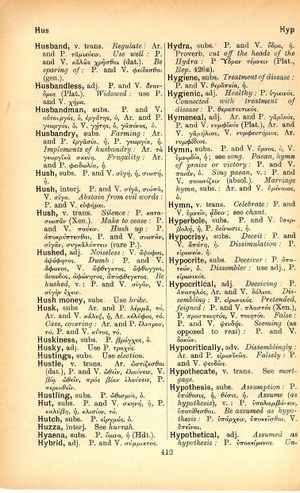hydra: Difference between revisions
στάζει γὰρ αὖ μοι φοίνιον τόδ᾽ἐκ βυθοῦ κηκῖον αἷμα → blood oozing from the deep wound, bloody gore drops oozing from the depths of my wound
m (Text replacement - "(|thumb)\n(\|link=)" to "$1$2") |
m (Woodhouse1 replacement) |
||
| Line 1: | Line 1: | ||
{{Woodhouse1 | {{Woodhouse1 | ||
|Text=[[File:woodhouse_412.jpg|thumb|link={{filepath:woodhouse_412.jpg}}]] | |Text=[[File:woodhouse_412.jpg|thumb|link={{filepath:woodhouse_412.jpg}}]] | ||
P. and V. [[ὕδρα]], ἡ. | ===substantive=== | ||
Proverb., | |||
[[prose|P.]] and [[verse|V.]] [[ὕδρα]], ἡ. | |||
Proverb., [[cut off the heads of the Hydra]]: [[prose|P.]] [[Ὕδραν τέμνειν]] ([[Plato]], ''[[Republic]]'' 426E). | |||
}} | }} | ||
{{Gaffiot | {{Gaffiot | ||
Revision as of 09:09, 20 May 2020
English > Greek (Woodhouse)
substantive
Proverb., cut off the heads of the Hydra: P. Ὕδραν τέμνειν (Plato, Republic 426E).
Latin > French (Gaffiot 2016)
hydra,¹¹ æ, f. (ὕδρα), hydre de Lerne : Lucr. 5, 27 ; Virg. En. 6, 576 ; Ov. M. 9, 192 || le Serpentaire [constellation] : Cic. Arat. 34, 292.
Latin > German (Georges)
hydra, ae, f. (ὕδρα), I) eine Wasserschlange, als Ungeheuer der Mythe, wie die mit 50 Rachen in der Unterwelt bei Verg. Aen. 6, 576. – bes. aber hydra Lernaea u. bl. hydra, die vielköpfige Schlange im See Lerna (s. Lerna), der, als ihr Herkules die Köpfe abschlug, statt jedes abgeschlagenen Kopfes zwei andere wuchsen, worauf der Held sie dadurch tötete, daß er mit Hilfe seines Wagenlenkers Jolaus die Stellen, wo die Schlangenköpfe sich erneuerten, mit Holzbränden ausbrannte, Varro sat. Men. 299. Lucr. 5, 27. Hor. carm. 4, 4, 61: dah. videto, ne hydra sit tibi et pellis (d.i. das Geringere, Leichtere), Hercules autem (das Schwerere, Wichtigere) relinquatur, Cic. de or. 2, 71: Lernaeas pugnet ad hydras = unterzieht sich den größten Gefahren, Prop. 2, 24, 25. – II) nom. propr., Hydra, ae, f. A) die lernäische Schlange als Mutter des Zerberus, Cic. poët. Tusc. 2, 22. – B) die Wasserschlange, ein Gestirn, sonst Anguis gen., Cic. Arat. 292.
Latin > English
hydra hydrae N F :: water-serpent, snake

